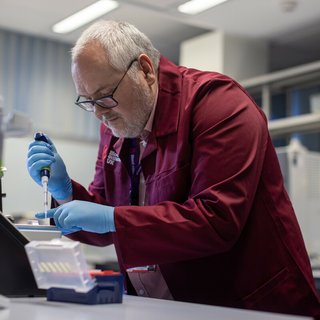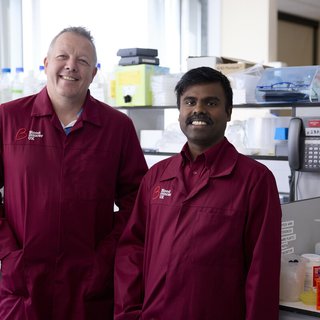Acceleration through strategy and science: highlights from our 2025 Research Symposium
United Kingdom
In July, 120 leading blood cancer researchers and partners gathered for Blood Cancer UK’s Research Symposium at the Royal College of Physicians. With 14 presentations on 7 different blood cancers, researchers shared bold ideas and their latest progress as we launched our new Research Strategy. For those who couldn’t join us in London, here’s what happened.
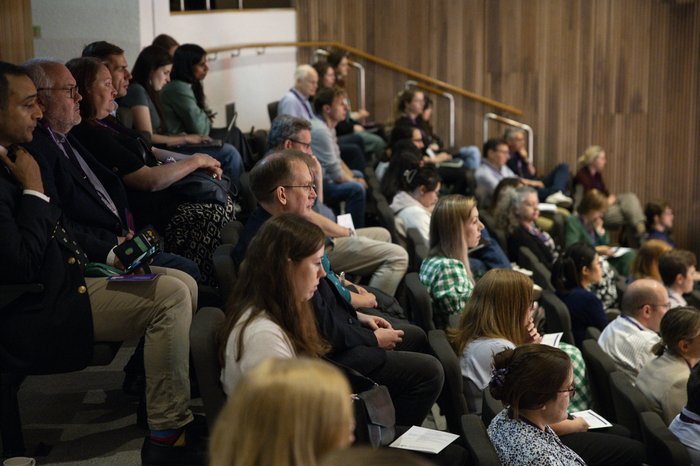
Blood Cancer UK's 2025 Research Symposium
Accelerating through collaboration is key
Our Director of Research, Policy and Services, Dr Rubina Ahmed, kicked off the event reflecting on our impact over the last decade, directly supporting the careers of 468 scientists.
“As a community we have achieved so much with our research. It’s this solid foundation that makes me confident that we can overcome the challenges that remain, and beat blood cancer for good.”
- Dr Rubina Ahmed, Director of Research, Policy and Services at Blood Cancer UK
But even against this backdrop of rapid progress, there is still more to do. The energy in the room was high as the event marked the launch of Blood Cancer UK’s new 2025–2030 Research Strategy, including our headline commitment to invest £70 million into research over the next 5 years!
A keynote speech by Dr Raghib Ali, Chief Medical Officer at Our Future Health, followed. He updated the audience about the UK’s largest research programme, and at Blood Cancer UK, we’re collaborating with them to advance research into blood cancers. Dr Ali highlighted the UK’s unique position to lead global progress thanks to our health system and data infrastructure. His message was clear - meaningful collaboration is one of our greatest accelerators.
Because we want to stop people from getting blood cancer at all
Then it was time to hear from our researchers!
A small but dedicated community of our scientists are finding ways to identify people at risk of developing blood cancer, target pre-malignant disease, and prevent transformation into more aggressive blood cancers. Prevention has been a major focus of research in solid tumours, but not to the same extent for blood cancer. Yet knowledge and technology are advancing all the time – and there is a lot of excitement among scientists about the potential for prevention in blood cancers.
First up, we heard about exciting research findings coming out of a lab at the Cambridge Stem Cell Institute. Dr Gonia Gozdecka presented her research identifying that a widely used diabetes drug, metformin, may be able to help prevent people at high risk of acute myeloid leukaemia (AML) developing the disease.
Discoveries like these are helping us move forward, expanding our focus into new areas including prevention. And we also heard from Professor Claire Edwards, who shared insights on how fat cells may reactivate ‘sleepy’ myeloma cells, waking them up and causing the disease to return.
In the last talk of the session, Professor Lesley Anderson updated the research community on the MOSSAIC study - a UK-wide study that aims to identify what causes myeloproliferative neoplasms (MPNs).
Because early detection will improve outcomes for people with blood cancer
After a break, the focus turned to how we can spot blood cancer earlier and more accurately. Dr Dan Royston, from the University of Oxford shared mounting evidence that clinicians aren’t always consistent in reviewing bone marrow biopsies and understanding how likely the disease is to progress. The data he presented included findings about an AI-based assessment, which could give clinicians more insight into the disease development and give more accurate information to their patients.
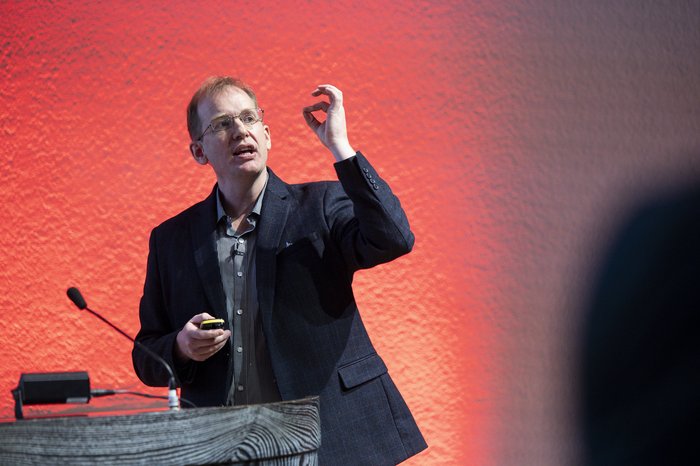
Dr Daniel Royston explains his research findings
Dr Sarra Ryan from the University of Newcastle followed, showcasing a new sequencing technique revealing previously hidden DNA changes in the development of childhood blood cancer. Innovations like this could allow for faster, more personalised intervention, with Dr Heather Long sharing how she is uncovering biomarkers which may help to predict a blood cancer that can develop following a stem cell transplant.
Because we can develop new treatments that cure blood cancer for good
After lunch, and a time for networking, five researchers talked about research into better treatments. Cardiff’s Alex Tonks about the discovery of a cellular pathway that could be targeted in acute myeloid leukaemia, and Professor Michelle West, shared her teams’ latest drug discovery work to target blood cancers that are triggered by the Epstein-Barr virus, leaving healthy cells unharmed.
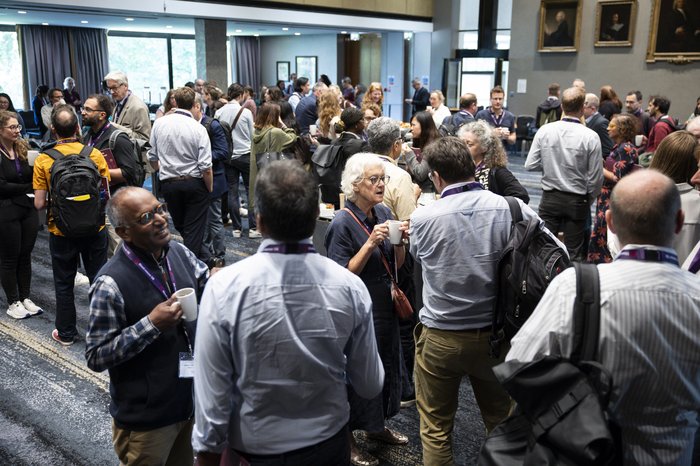
Researchers networking in the break
Dr Charlotte Graham revealed a new three-day CAR-T cell production process creating these cells in the hospital, which could make this advanced therapy more accessible. They plan to establish this process in an early-stage clinical trial testing this new type of CAR-T in 20 people whose myeloma has come back after receiving three currently available treatments.
In the final presentation by our researchers, Professor Terry Rabbitts and Dr Daniel Sanchez-Guzman took to the floor to talk us through how they are engineering antibodies in their quest to develop novel treatments for a blood cancer - T-ALL. It’s particularly exciting as the innovative technique could, in future, be applied across many different blood cancers.
Because we put people with blood cancer at the heart of research
In the last session of the day Lisa Whittaker, Research Involvement Lead at Blood Cancer UK, spoke about the power of directly involving people with blood cancer in all stages of the research process.
The people affected by blood cancer are at the heart of everything we do as a charity. And Lisa acknowledged while we already involve people affected by blood cancer in deciding what research we fund, we know there are more areas where they can make a valuable contribution.
She offered support to researchers to help meaningfully involve people affected by blood cancer as early as possible in their work, for example helping to set the research questions and design their studies.
We’re proud to have brought together so many of our incredibly talented and committed researchers - it’s through their hard work and amazing discoveries that we will bring forward the day when no one dies of blood cancer or its treatments.

